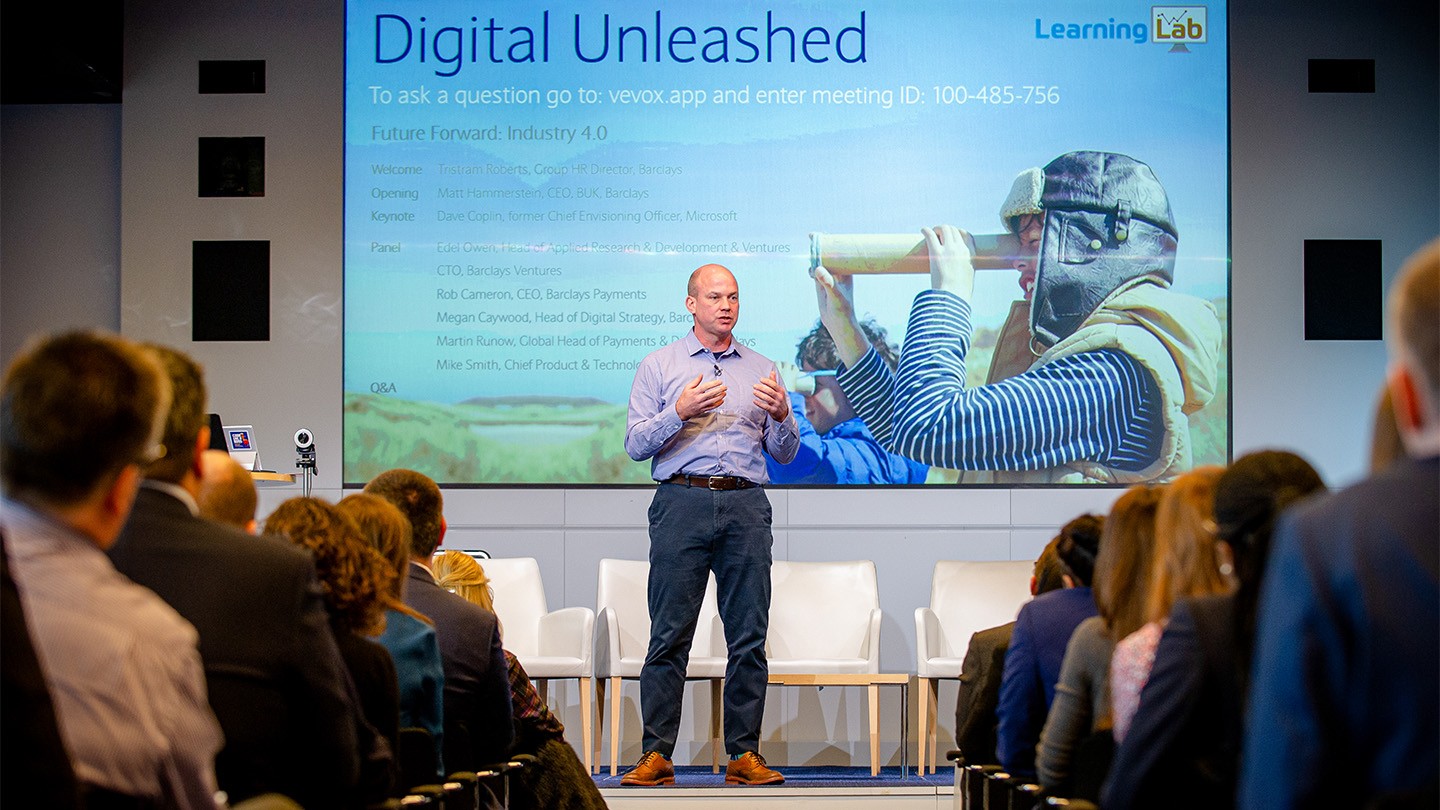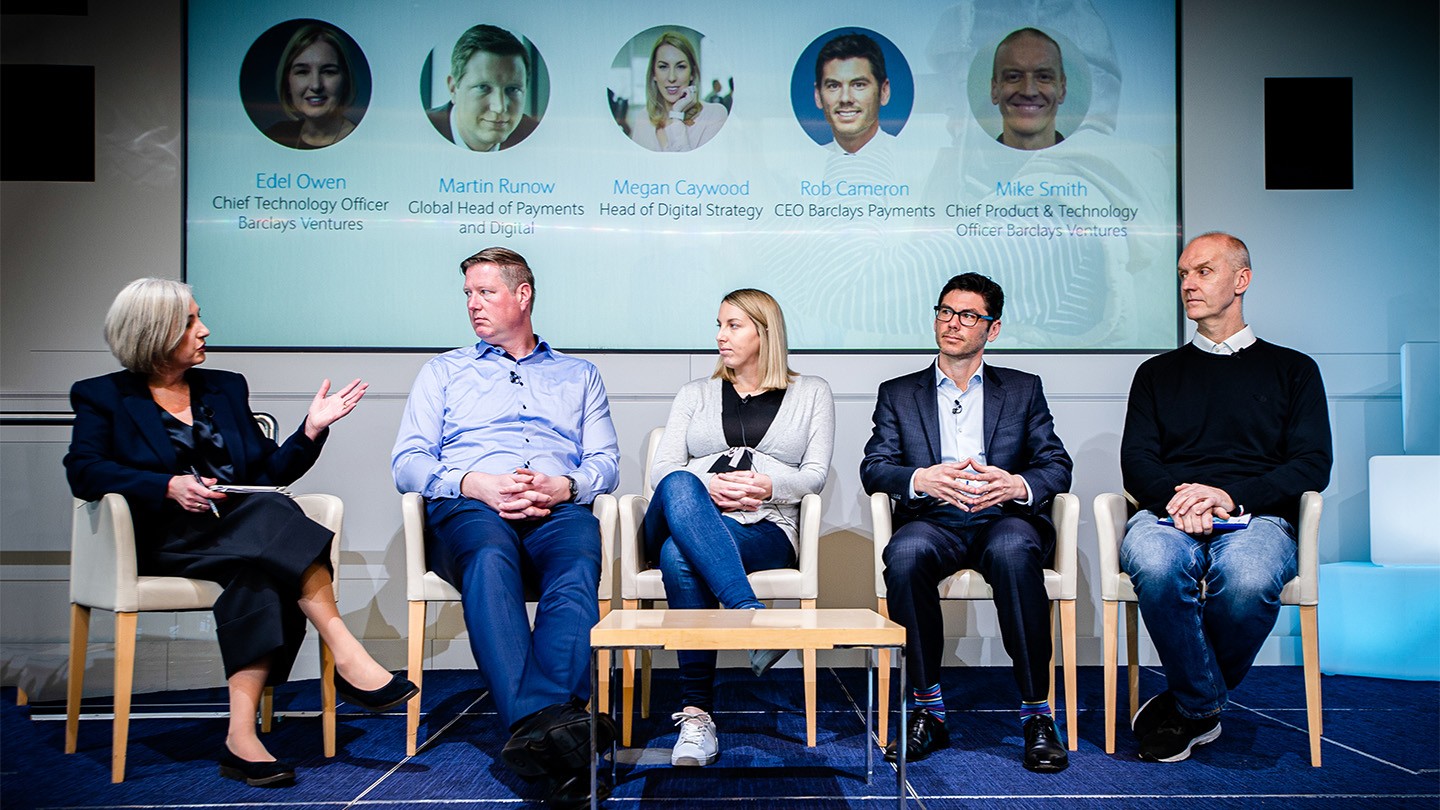
Innovation
Future forward: making sense of Industry 4.0
The coronavirus crisis has increased the importance of digital in every aspect of our lives, as people across the world adapt to the ‘new normal’. With the pandemic accelerating the speed of innovation throughout the financial sector, we share key takeaways from a panel discussion at Barclays’ fourth Digital Unleashed series, which examined how Industry 4.0 – the new landscape of data, machine learning and interconnectivity – is impacting the sector.
“It ain’t what you do”
“The most important thing about the future of technology is what humans choose to do with it” Dave Coplin, Author and former Chief Envisioning Officer at Microsoft, told the audience, arguing that “it’s not an adversarial battle between humans and machines”.
He went on: “There’s an opportunity to automation – allowing, for example, doctors to spend more time with their patients rather than looking at scans. You will face this as an organisation, and your customers are going to face this. You’ll be measured by what you choose to do with the extra time and capacity humans have to do the things that the machines aren’t doing. The fundamental skills of our digital future are human skills: the ability to communicate, to be creative, to treat each other with empathy and respect.
“What makes you special is not your products and services; what makes you special is how you choose to provide those products and services: ‘It ain’t what you do, it’s the way that you do it.’ I call it the Fun Boy Three principle of digital transformation.”

If we’re going to transform the company we need people to accept, understand and be excited about technology changing things, and not being scared of it. The more people who participate in sessions like this, the faster we can transform the company and better we can serve customers’ needs
CEO, Barclays UK
Redefining productivity
Coplin pointed out that current definitions of productivity are “cold economic equations forged in the fires of the Industrial Revolution”. New thinking is required to avoid technology simply being used to make the old Victorian ways of working “a bit quicker and a bit cheaper”, he said.
“The only way for us to go forward – to work smarter not harder – is to think about the value of work. It starts with data, and the ability to harness data as a key asset in defining your strategy is one of the hallmarks of a digital organisation. Using that data in strategic ways fundamentally changes the way you see the world.”
What is Industry 4.0?
Megan Caywood, Barclays’ Head of Digital Strategy said: “Industry 4.0 means looking at machine learning, data and interconnectivity. For Barclays, that means looking at how we embrace digital transformation, and how we collaborate.”
Rob Cameron, CEO of Barclays Payments, gave a real-world example: “It’s about looking at how we can use technology to change processes to the benefit of the customer. For example, we recently transformed our onboarding process. Our digital POD worked to build a better journey while also attacking the underlying questions set. Their work reduced the questions by 75% for new to bank customers and by nearly 95% for existing bank customers. Technology is now used to inherit the rest of the data across. Having rolled this out at the start of 2020, we’ve seen call time reduced by two-thirds, meaning agents can spend more time ensuring the best solution for the customer.”
Industry 4.0 means looking at machine learning, data and interconnectivity. For Barclays, that means looking at how we embrace digital transformation, and how we collaborate
Barclays Head of Digital Strategy

How well placed is the UK?
Cameron argued that the UK’s financial services sector is uniquely placed to take advantage of Industry 4.0: “In such a scale market, we are constantly inspired to keep raising our game and delivering more for our customers. We’ve created things here, because of the competition, that they don’t have in other markets.”
Caywood agreed: “The UK is the most advanced in terms of financial services, with the regulations supporting new entrants, which in turn makes incumbents compete more. PSD 2 – the EU’s Payment Services Directive – has inspired Australia, Hong Kong and Singapore in terms of how an industry can be improved to deliver better services for customers and it’s something the UK has been doing well. Given we’re a global company, there are things we’re doing here that are far in advance of some of our US competitors that we can start translating across.”
Mutual benefits
Martin Runow, Global Head of Payments and Digital at Barclays Corporate Bank, explained how events like Digital Unleashed, and wider tech education among Barclays colleagues, help foster expertise that improves the bank’s ability to serve their clients: “We run a lot of training for everyone in corporate banking to talk about digital, because relationship managers are going to talk with clients, and they will need to talk about Industry 4.0 and how it’s affecting business models. Technology is not just about employing tools – it’s also about educating ourselves to speak about it.”
Explaining the thinking behind Digital Unleashed, Matt Hammerstein, CEO of Barclays UK, describes the fortnight of events – which saw panels in the UK and US broadcast to 13,000 registered colleagues – as a great way for the bank to collaborate with clients and partners. “This event didn’t happen as a consequence of a memo from management,” he said. “It was built by colleagues for colleagues.
“Given the nature of what we do, and how the fabric of the economy works, we have a great opportunity to harness the lessons and experience of all the people we work with. We’re working with other people who have a vested interest in us making that digital transformation and being better able to serve the modern technologically driven economy. It’s mutual self-interest: we benefit from their experience and they benefit from us being better able to serve their needs.”
He added: “If we’re going to transform the company we need people to accept, understand and be excited about technology changing things. The more people who participate in sessions like this, the faster we can transform the company and better we can serve customers’ needs.”